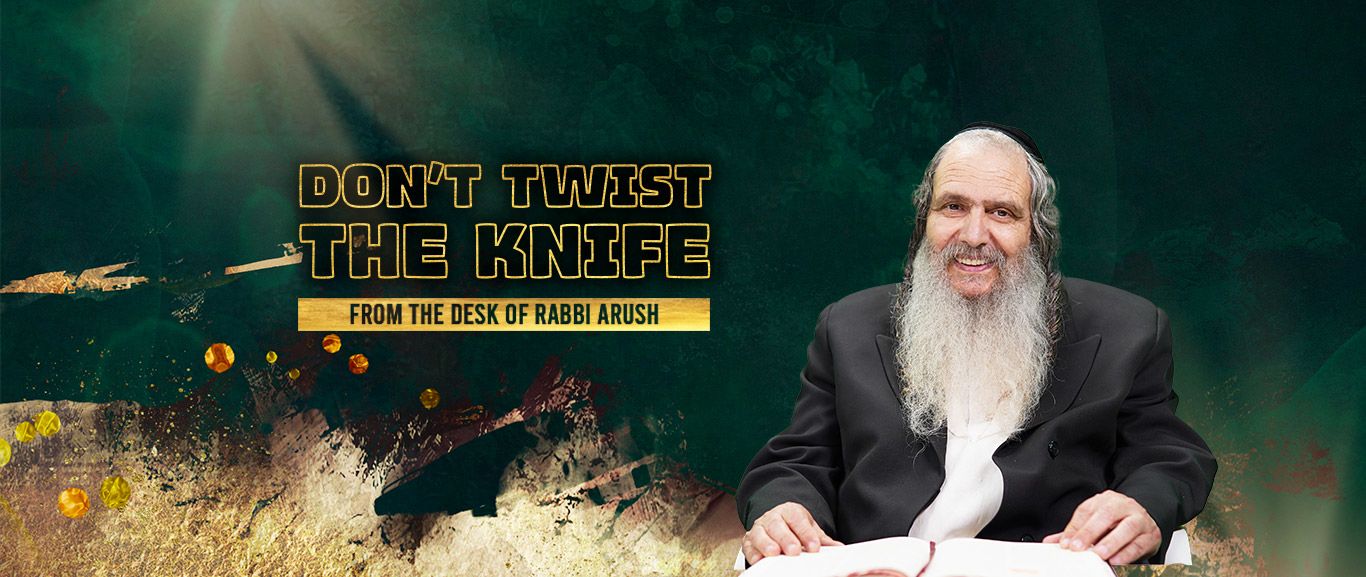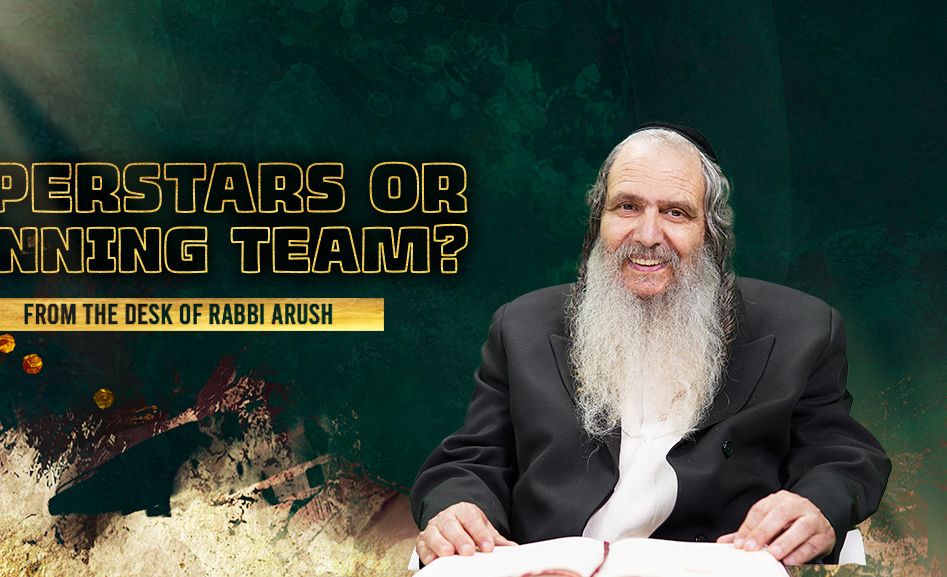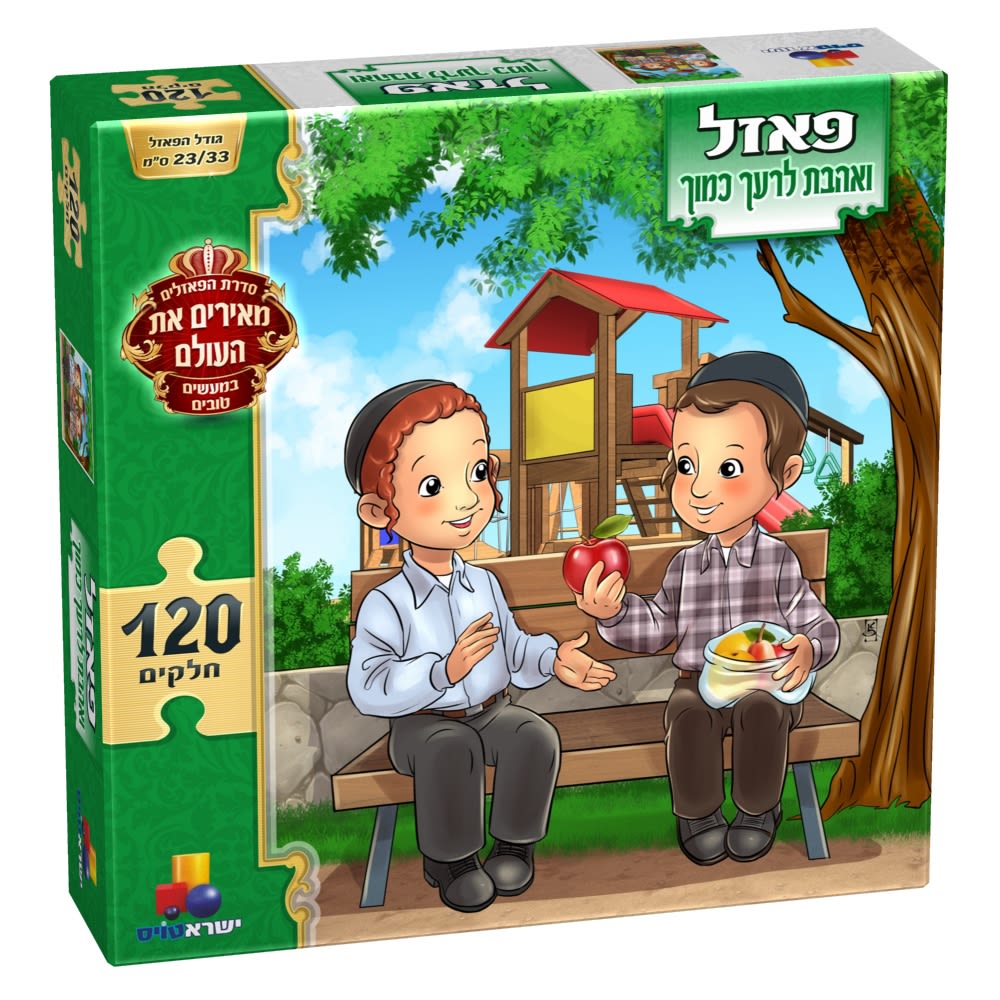
Don’t Twist the Knife
Moshe had ten wonderful and pious sons, who gave him much nachat (joy). But he had one son who refused to stay on the path...

The Piercing Pain
Reb Moshe never raised his voice at home, but at that moment he couldn’t stand it anymore and shouted – and the shout seemed to have a life of its own: “Enough! Be quiet! I can’t take it! I am not willing to hear such speech anymore in my home!”
Moshe had ten wonderful and pious sons, who gave him much nachat (joy). But he had one son, Chanan, who refused to stay on the path. In his childhood, already Chanan had caused Reb Moshe much distress. It was hard not to see that this child’s mind was in a different place. No one was surprised when Chanan left the house one day, leaving behind the Jewish way of life as well and adopting a non-Jewish lifestyle.
After his son went off the derech, Reb Moshe’s heart felt very heavy. Extremely heavy. Having a son leave the way is harder than enduring the battle of Gog and Magog at the End of Time. Moshe would cry secretly over his beloved son and pray for him ceaselessly. The agony was felt in daily life, and of course, even more so on Shabbat, when Reb Moshe would remember his son, and shrink from the thought. But the holidays, when all the children would be sitting around the well-set table, singing and saying words of Torah, without Chanan being there – that was like a sword piercing Reb Moshe’s heart.
The Last Straw
But all of this was not the worst of it. For Moshe, the worst pain was when the talk around the table turned to Chanan, with each of the brothers telling of Chanan’s latest escapades. They would add more details, more bad news; they would tell of his breaking new records in his deterioration and negative behavior. The brothers spoke disdainfully about their brother’s new lifestyle, and that was, seemingly, a good thing: Reb Moshe certainly wouldn’t have wanted them to see him as a role model. And still, every word burned a new hole in Reb Moshe’s wounded heart, up to the moment when everything exploded, and he silenced his children angrily.
The children were not the only ones to be shocked by their father’s outburst – Reb Moshe himself was frightened by it, either by the outburst itself or by his realization of the tremendous amount of pain that had accumulated inside him. His good and well-educated children understood immediately what they were to do, and, of course, did not continue speaking about Chanan. But Reb Moshe, after he calmed down, felt a need to apologize and share his feelings with his sons.
“My dear sons, I love you and am proud of you. But Chanan is also my son. He has chosen his way, and I feel the pain of that choice each and every minute. But when you speak about him, you are sprinkling salt on my wounds and causing me ten times the amount of that pain.”
“I feel as if Chanan stabbed me, but you are twisting the knife repeatedly in my heart.”
The Good Approach
When their father left the house, the children sat there, ashamed of themselves, and tried to think what they can do so that they will not cause their father further distress. Most of the brothers thought that they should decide together that from now on they will not mention Chanan’s name in the house, so as not to upset their father. But the oldest son, who was both wise and sensitive, disagreed and said: “That is not the way, my brothers. Chanan is very dear to our father, like all of us are. Father remembers him every moment. Father’s distress is not caused by our mentioning his name; Father’s distress is caused by our speaking negatively about Chanan. But he will surely be happy to hear positive things. Let us start to call Chanan from time to time and tell him that we miss him, and perhaps even visit him. And, most important – we can pray for him. From today onward, at family gatherings we will speak about our phone-calls, about how we wish to know how he is doing, and how we are praying for him. And we will mention to our father every positive act and speech and every small sign of awakening on Chanan’s part.”
He was completely right. Reb Moshe got much pleasure from this new approach.
The Mishkan of Unity – Second Step Up
Last week we wrote that the goal of the Mishkan was that the entire Jewish People be united around the service of Hashem, each person in his own way and using his own strengths, according to the tools that Hashem gave him. This teaches every Jew that the service of Hashem is not something personal, but rather a joint effort of all Jewish people. Everything that a Jew does and every personal connection of every Jew with his Creator is for and in the name of the entire Jewish People, and all of us are obligated to always feel connected and connect our prayers and service to all other Jews.
This is the general goal of the Mishkan, but it is also expressed in a great many small details. For example, in the fact that the names of the twelve tribes were etched onto precious stones placed on the heart of the Cohen Gadol, and on the shoham stones that were on his shoulders.
But there is another expression of it, which takes the whole story a step further: the eleven components of the ketoret – the incense, among which is a very important and significant one: the chelbenah.
In the Mishkan, the ketoret was burned every morning and evening on the golden altar inside it, which was used only for this. The good and even amazing fragrance of the ketoret would waft to great distances. But, in contrast with the ketoret’s fragrant components, the chelbenah has a bad odor. Why mix a bad odor in with perfumes and spices? To teach us that in spite of the fact that among the Jewish people there are wicked persons whose deeds are not right, one must maintain contact with them (ketoret meaning “contact” in Aramaic), and tie them as best we can to the service of Hashem.
We Are All Children of One Man
And that is a step up. Because we might have thought – mistakenly – that the Mishkan personifies the unity of the Jewish People, but that perhaps the idea is to unite with good Jews, from the simple to the lofty, but not to unite with sinners and wicked people. Perhaps these should not be loved, and there is no need to be connected to them. Comes the ketoret and teaches us: No, no! Connecting with the Jewish People means a connection with each and every Jew, wicked and sinners included, because the wicked ones and the sinners are also children of Hashem; Hashem loves them and misses them.
Of course, this does not mean one should identify with bad deeds, chas veshalom, but, like in the parable about Reb Moshe, Hashem does want us to feel that they are our brothers and that we should respect them and greet them with a loving attitude that will bring them closer. We should see them as our brethren and search for whatever good and beauty they possess, and certainly not search for the bad in them and not speak against them, because speaking badly about any Jew, wherever he may be, is very distressing to our Father in Heaven and pains Him, as it were, even more than the actual bad deeds.
Infinite Segulot
When we are all connected, like one person, and when we do not separate ourselves from any Jew, then we provide Hashem with great nachat, because the ketoret is one of the holiest and loftiest offerings and it contains an infinite number of segulot – benevolent outcomes. And therefore, on the holiest day in the year, the Cohen Gadol burns incense in the Holy of Holies, and the entire atonement of the entire Jewish People is done under the covering of the cloud of incense: “For in a cloud I will be revealed on the kaporet”, and it contains great, sublime secrets and unbelievable segulot for salvation and for stopping epidemics.
Because, really, Jewish unity and loving other Jews – all Jews, even those who are at the bottom of the bottom spiritually – is the basis of any service of Hashem. It is the only way to reach all the high levels; it is the root of any revelation of the Shechina in the world; it is the root of any atonement for sins; it is the root for all the salvation and nullification of all the strict judgements, and it is the greatest segulah possible!








Tell us what you think!
Thank you for your comment!
It will be published after approval by the Editor.